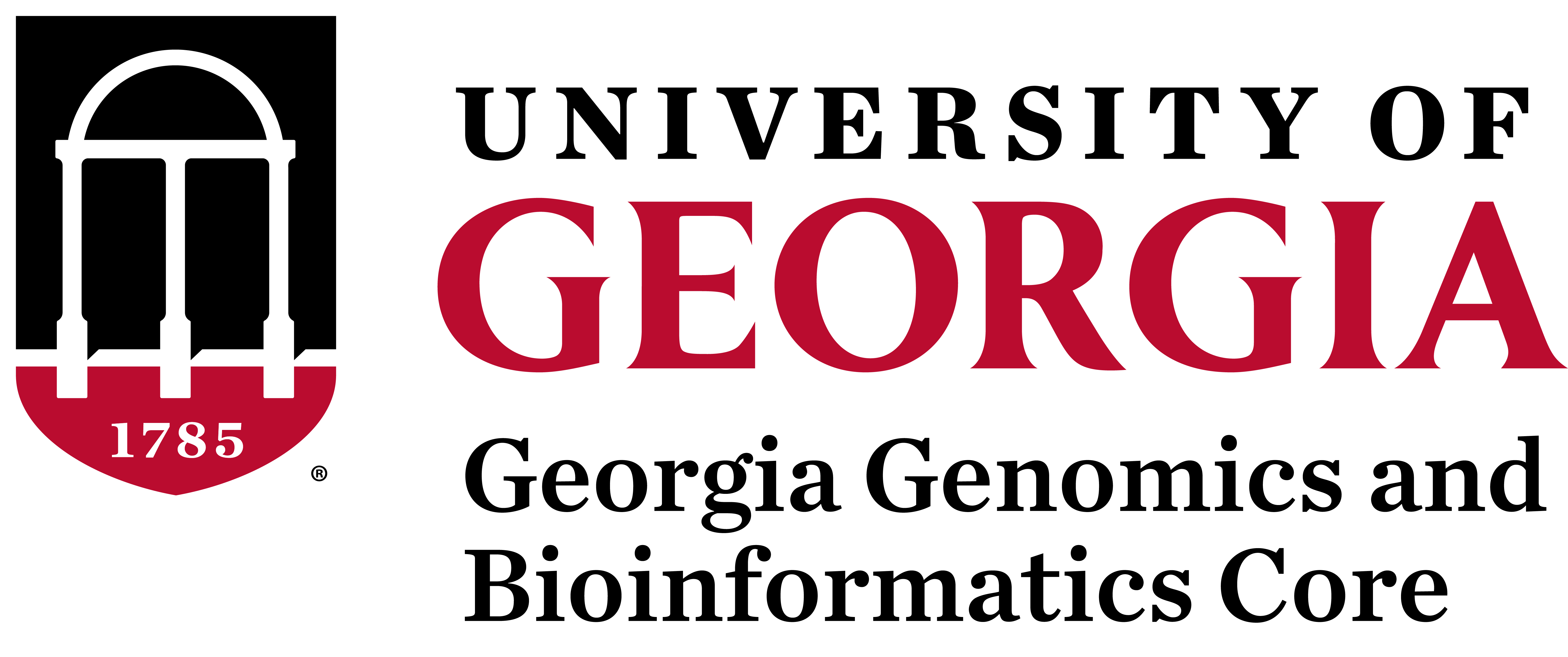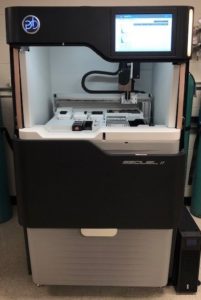PacBio Sequel II Sequencing
Consultation and Assistance
Contact for PacBio Technical Assistance
Please contact Kateryna Stoianova: kstoianova.@uga.edu, Lab Technician, for technical questions about existing or new Sequel projects.
More contacts
Please visit our “All Inquiries” page for detailed information about who you should contact at GGBC to receive a quick and accurate response.
Sample Preparation
High-quality, high-molecular-weight genomic DNA is crucial for obtaining long read lengths and optimal sequencing performance The SMRT library preparation process does not utilize amplification techniques and resulting library molecules are directly used as templates for the sequencing process. The quality of the DNA and RNA starting material will be directly reflected in the extent of sequencing success or failure. Any unrepaired or irreversible DNA damage present in the input material (e.g., interstrand crosslinks, nicks, etc.) or contaminants will result in impaired performance in the system.
Required quantitation method:
For DNA, please use pico green or equivalent fluorometric method (e.g., QUBIT).
For RNA, please use either ribo-green or QUBIT.
DNA quality: DNA should be high molecular weight without any smear of degradation products. For best results it is imperative that the input DNA size is significantly higher than the desired insert size of the final library. For 20 Kb SMRT libraries, the DNA should be higher than 30 Kb, and for 10-15Kb SMRT library, the DNA should be larger than 20 kb. Longer read lengths can be achieved with higher input amounts of sufficiently high molecular weight input.
DNA purity is especially crucial for successful sequencing with PacBio. The 260/280 ratio should be around 1.8 (+/- 0.2) and the 260/230 should be in the 2:2.2 range. Significant contaminants that cannot be removed by bead cleanup can cause library prep and/or sequencing to fail.
RNA quality: Good quality, intact RNA is essential. RIN must be ≥8.0 as indicated by the Agilent Bioanalyzer.
Buffer: DNA or RNA should be in 10 mM Tris, pH 7.5-8.0. Water is okay if it is nuclease free, but buffer is preferred.
Required DNA and RNA quantities and concentration:
Standard gDNA library prep: a minimum of 4 ug of DNA per sample is required. Please submit samples in single lo-bind tubes in a volume of 100 uL or less. Higher volumes will require concentration into a smaller volume.
Standard HiFi library prep: a minimum of 15 ug of >40kb gDNA is required. Please submit samples in single lo-bind tubes in a volume of 100 uL or less. Higher volumes will require concentration into a smaller volume. If your DNA is sufficiently high molecular weight and you can provide enough input material, we recommend providing significant excess DNA for aggressive size selection to achieve longer read lengths.
Low Input HiFi library prep: a minimum of 400 ng of >30kb gDNA is required. Please submit samples in single lo-bind tubes in a volume of 100 uL or less. Higher volumes will require concentration into a smaller volume. For large and complex genomes that require multiple SMRT Cells and where DNA can be extracted in abundant quantities from a single individual sample, we recommend constructing a HiFi library using the standard HiFi library prep.
Ultra-Low Input HiFi library prep: 5-20 ng of >20kb gDNA is required. Library size will be shorter than standard and low input HiFi (8-10 kb). If DNA availability is not a constraint (e.g. >150 ng DNA), we recommend using the low DNA input procedure for up to 1Gb genome size. For large and complex genomes that require multiple SMRT Cells and where DNA can be extracted in abundant quantities from a single individual sample, we recommend constructing a HiFi library using the standard workflow.
Multiplexed Microbial libraries: For each sample, 1 µg of gDNA is required. For optimal results, input gDNA must migrate predominantly above 20 kb as determined by pulsed-field gel electrophoresis. Up to 48 samples can be multiplexed in one run. If you are submitting 24 or more samples, please submit samples in a 96-well plate and include an Excel file with the sample layout in your order.
Iso-Seq Method: at least 10uL of >45 ng/uL of total RNA is required per sample. A RIN (RNA integrity number) ≥7.0 (ideally ≥8.0) is sufficient for the Iso-Seq protocol. Samples with a RIN <7.0 can be processed, but the risk of significant underperformance or even failure is greatly increased. The protocol supports up to 12 barcodes.
For more information about protocols, requirements and applications please refer to the Sequel Systems Application Options and Sequencing Recommendations table
If you are submitting 24 or more samples, please submit samples in a 96-well plate and include an Excel file with the sample layout in your order.
PLEASE USE V BOTTOM PLATES DESIGNED FOR MOLECULAR BIOLOGY AND NOT FLAT BOTTOM PLATES DESIGNED FOR OTHER PURPOSES.
PacBio Guidelines for Successful SMRTbell Libraries
Q&A for “DNA Quality Requirements for Single Molecule, Real-Time (SMRT) Sequencing”
Prices and Quotes
Contact for Financial Inquiries and Quote Requests
Please email the GGBC at ggbc@uga.edu, for financial inquiries or to request a quote. Please be as specific as possible, so that we can more quickly assist you.
A Note About Single SMRTcell Projects:
SMRTcell sequencing results depend on the final loading concentration of the library. Due to the nature of the technology, optimal concentrations can vary greatly between libraries and PacBio recommends running 2 titration SMRTcells to find the optimal concentration before running production SMRTcells. With this in mind, please be aware that projects requesting a single SMRTcell may have variable results. In most cases the first SMRTcell performs well and this is not an issue, but sometimes additional sequencing is needed. When this happens, the customer is expected to cover the cost of additional sequencing.
PacBio Sequel II DNA library preparation and SMRT cell run fees
| Step | Service | UGA Fee | Non-UGA Fee | Commercial Fee |
|---|---|---|---|---|
| 1. QC | DNA quality assessment for PacBio library | $16 | $18.90 | $20 |
| RNA quality assessment for PacBio library (per group of 11 samples) | $92 | $109 | $115 | |
| 2. Libraries | Full-length Barcoded Amplicons of 16S/18S/ITS (1-24 samples) | $1,345 | $1,588 | $1,682 |
| Full-length Barcoded Amplicons of 16S/18S/ITS (25-48 samples) | $1,617 | $1,909 | $2,022 | |
| Full-length Barcoded Amplicons of 16S/18S/ITS (49-72 samples) | $1,940 | $2,290 | $2,425 | |
| Full-length Barcoded Amplicons of 16S/18S/ITS (73-96 samples) | $2,259 | $2,666 | $2,824 | |
| Library from Amplicons | $617 | $729 | $772 | |
| Ultra Low input (non multiplexed) HiFi library | $1,235 | $1,458 | $1,544 | |
| High Fidelity Library (HiFi) (non multiplexed) | $655 | $773 | $819 | |
| Large SMRTbell library (15-20kb and >30kb)(can be multiplexed; see price below) | $533 | $629 | $667 | |
| IsoSeq Library | $584 | $690 | $730 | |
| MAS-Seq for 10xSingle Cell 3' Concatenation | $1,363 | $1,609 | $1,704 | |
| HiFi Viral library (per 96-well plate) | $5,744 | $6,778 | $7,180 | |
| xGen Hybridization using IDT probes | $900 | $1,062 | $1,125 | |
| 2. Multiplexed Libraries | Multiplexed SMRTbell genomic libraries: Pre-multiplexing (per sample) | $399 | $471 | $499 |
| Multiplexed SMRTbell genomic libraries: Post-multiplexing (per pool) | $143 | $169 | $179 | |
| Pre-multiplexing PCR Barcoded IsoSeq libraries (per sample) | $352 | $416 | $440 | |
| Post-multiplexing PCR Barcoded IsoSeq libraries (per pool) | $352 | $416 | $440 | |
| Pre-multiplexing Ligation Barcoded IsoSeq libraries (per sample) | $545 | $644 | $682 | |
| Post-multiplexing Ligation Barcoded IsoSeq libraries (per pool) | $30 | $35.40 | $37.50 | |
| 3. Library QC | Quality assessment of final SMRTbell library/pool | $63 | $74.50 | $78.75 |
| 4. Sequencing | DNA library binding, annealing, and cleanup prior to sequencing | $285 | $337 | $357 |
| PacBio Sequel SMRTCell sequencing run for CLR/HiFi (15 hrs) | $1774 | $2094 | $2218 | |
| PacBio Sequel SMRTCell sequencing run for IsoSeq (26 hrs) | $2100 | $2478 | $2625 | |
| PacBio Sequel SMRTCell sequencing run for HiFi (30 hrs) | $2400 | $2832 | $3000 | |
Data Retrieval
- Primary analysis files will be transferred to customers through the GGBC’s data distribution FEX server. The following files are an example of the primary analysis output files: • *.adapters.fasta • *.scraps.bam.pbi • *.subreads.bam • *.subreadset.xml • *.txt • *.scraps.bam • *.sts.xml • *.subreads.bam.pbi • *.transferdone.
- The primary analysis files will be permanently deleted from GGBC’s data storage after 6 months from the data transfer date.
Sequenced Species
Table 1. Organisms Sequenced on the PacBio Sequel at GGBC
| IsoSeq | |
|---|---|
| Azalea | Rhododendron canescens |
| Copepods | Neocalanus flemingeri, Pseudocalanus, Metridia pacifica |
| Fish | Gasterosteus aculeatus, Polyodon spathula |
| Gerbil | Mongolian gerbil |
| Mosquito | Anopheles stehpensi |
| Nematode | Bipalium kewense |
| Plant | Bipalium kewense, Red Palm Weevil |
| Synthetic RNA | |
| Large Molecule Library | |
| Algae | Picocystis salinarum |
| Animal | Anolis sagrei, Heloderma charlesbogerti, Homarus americanus, Stickleback fish |
| Bacteria | Aetokthonos hydrillicola, Bacillus, Bifidobacterium, Delftia, Rhodococcus, Serratia, Sphingobacterium, Xylella fastidiosa |
| Fungi | Ganoderma, Hymenochaete, Meyerozyma, Oudemansiella, Phlebia, Pleurotus flabellatu, Trametes cubensis, Trametes elegans |
| Insect | Adelges cooleyi, Aphid, moth, Osmia lignaria |
| Nematode | Caenorhabditis elegans, Dirofilaria immitis |
| Plant | Angiosperm, Callicarpa americana, Capsicum, Craterostigma, Eragrostis nindensis, Hyssopus officinalis, Lpomoea purpurea, Nepeta cataria, Nepeta mussinii, Oryza, Pennisetum glaucum, Petrea volubilis, Prunus canescens, Prunus cerasus, Prunus fructicosa, Rice, Salvia hispanica, Solanaceous, Yucca brevifolia (Joshua tree), Zea mays |
| Microbial Multiplexing | |
| Bacteria | Acinetobacter, Chromobacterium, Enterobacter asburia, Enterobacter cloacae, Escherichia coli, Klebsiella pneumoniae, Neisseria meningitidis, Rahnella, Rhodococcus rhodnii |
| Yeast | Saccharomyces spp. |
| Enrichment | |
| xGen Lockdown Hybridization with IDT Probes | Mouse (Berkeley laboratory line) |
Applications
- Create high-quality whole genome de novo assemblies of eukaryotic organisms
- Survey large population cohort studies for structural variants
- Sequence full-length transcriptomes or targeted transcripts
- Target regions not currently accessible by other technologies
- Detect genomic variation in complex populations on all size scales
- Detect epigenetic modifications


